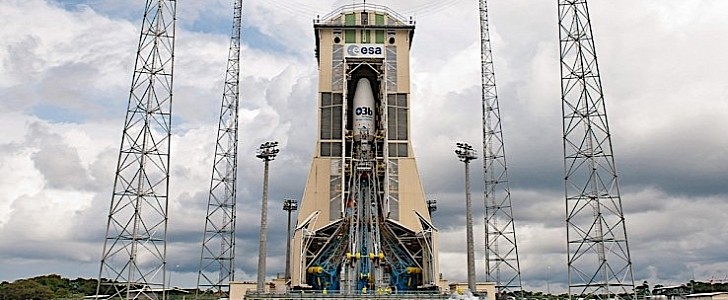Ages seem to have passed since humanity first started exploring the space around our planet. Throughout all this time, Western countries and their historic opponent, Russia, have always kept their cool and peace between them when it came to space business, as the agencies involved have always ignored the political, military, or other kind of turmoil going on down on this planet.
The current conflict between Russia and Ukraine seems to have changed that though. It all started with high-ranking Roscosmos officials declaring they could allow the International Space Station to drop from the sky, and culminated with the Russian space agency withdrawing its workforce from Europe’s Spaceport in Kourou in French Guiana.
On its end, the European Space Agency (ESA) is bound by its member states to follow the restrictions imposed on Russia, and said on the last day of February it is “fully implementing sanctions.”
The Russian withdrawal from Kourou also means ESA will no longer use the Russian-made Soyuz rocket for some of the launches it performs there and will have to find ways to incorporate each European payload on other rockets, like the upcoming Vega-C and Ariane 6.
“Regarding the Soyuz launch campaign from Europe’s Spaceport in Kourou, we take note of the Roscosmos decision to withdraw its workforce from Kourou,” the space agency said.
“We will consequently assess for each European institutional payload under our responsibility the appropriate launch service based notably on launch systems currently in operation and the upcoming Vega-C and Ariane 6 launchers.”
Additionally, we’re informed the projected launch later this year of the ExoMars mission, which was scheduled to take off onboard another Russian rocket, the Proton-M, as Europe’s first rover to be sent to Mars, will have to be delayed to a yet unknown date, but most definitely not in 2022.
On its end, the European Space Agency (ESA) is bound by its member states to follow the restrictions imposed on Russia, and said on the last day of February it is “fully implementing sanctions.”
The Russian withdrawal from Kourou also means ESA will no longer use the Russian-made Soyuz rocket for some of the launches it performs there and will have to find ways to incorporate each European payload on other rockets, like the upcoming Vega-C and Ariane 6.
“Regarding the Soyuz launch campaign from Europe’s Spaceport in Kourou, we take note of the Roscosmos decision to withdraw its workforce from Kourou,” the space agency said.
“We will consequently assess for each European institutional payload under our responsibility the appropriate launch service based notably on launch systems currently in operation and the upcoming Vega-C and Ariane 6 launchers.”
Additionally, we’re informed the projected launch later this year of the ExoMars mission, which was scheduled to take off onboard another Russian rocket, the Proton-M, as Europe’s first rover to be sent to Mars, will have to be delayed to a yet unknown date, but most definitely not in 2022.







